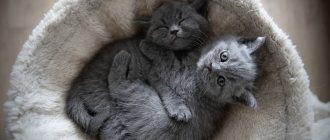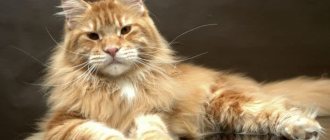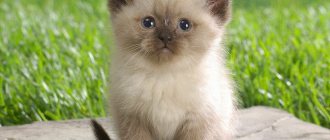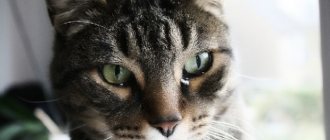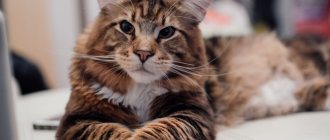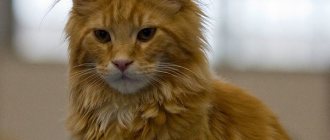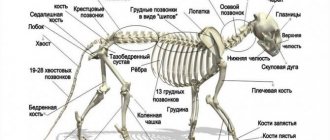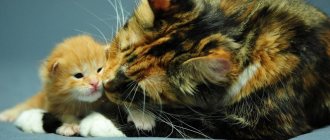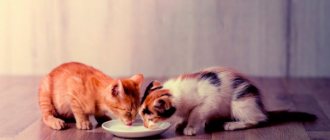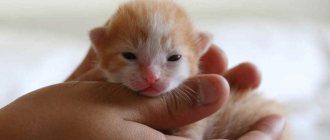Adult Maine Coons are famous for their large size and considerable weight for a domestic cat. And many people who have only recently become owners of babies of this breed are perplexed when looking at their funny, playful and still very small pet. Will he, too, someday turn into a huge, important and at the same time graceful cat? How do kittens grow and what factors can influence the size they eventually reach when they finally become adults?
Factors influencing growth
- Floor. Boy kittens grow faster than girl kittens and, as a result, when they finally mature, they reach larger sizes than their sisters.
- Genetics. Kittens from large parents are born with greater body weight and, as a rule, also grow up to be as large as their relatives.
- Physical condition of the newborn. Babies born weaker gain weight less quickly.
- Large litter size. Kittens from small litters are born larger than kittens from larger litters.
- Maintenance of mother kittens during pregnancy and while feeding offspring. If a mother cat eats properly and is kept in good conditions, then she produces healthy and strong offspring, which is the key to good growth and weight gain in babies.
- Stress. If there is a turbulent atmosphere in the house where the pet is growing up, if the owners are arguing, starting renovations, or something else is happening in their family that disrupts the usual rhythm of life in the house, then the kitten will gain weight worse due to strong worries.
- Past illnesses. Kittens that have recovered from the disease grow worse, and their growth may stop altogether for some time.
- Feeding. In order for a pet to grow well, it must eat properly and nutritiously.
Heredity depends not only on the mother of the kittens, but also on the father, so from different cats the same cat can produce offspring of different sizes.
What affects the sizes
The size of a Maine Coon kitten does not always correspond to the norm. The fact is that the growth of any pet very much depends on several factors that can significantly change the initial parameters. Therefore, any table of Maine Coon lengths by month will not be accurate. There are the following reasons for deviations from the development norm:
- genetics;
- environment;
- stress;
- mother's pregnancy period.
Speaking about genetics, there are several main points. First of all, there are certain characteristics of the breed itself. This applies to both Maine Coon cats and any other animals. In addition, the gender of the pet plays a significant role. In males, by the age of six months, the size often increases significantly compared to females. Strongly influence the growth and parameters of the parents.
Especially the size of the future cat depends on the length of the mother. The larger it is, the faster the baby will grow.
In addition to the size of the Maine Coon parents themselves, the combination of their genes also influences. After all, 2 DNAs always create a completely new organism that is unlike anyone else. The newborn develops its own skeletal and muscle tissue characteristics. Therefore, even kittens from the same litter can grow at different rates and reach different lengths and weights.
The size of an adult Maine Coon cat can be affected by taking any hormonal drugs or medications. Even if the course was short, the period of development of the kitten itself can either be delayed or accelerated. It is difficult to predict exactly how treatment will affect the development of the cat.
© shutterstock
Much depends on the living conditions of the animal. The size of a Maine Coon cat may change due to changes in sanitary conditions. Poor performance can harm the normal development of the Maine Coon breed, especially in the early stages.
Therefore, you should pay special attention to your pet’s hygiene and living conditions. You need to take care not only of the fur, but also, for example, of the cat’s face, especially the ears, eyes and nose.
Stress is also related to the previous point. Sharp sounds, temperature fluctuations and other irritating indicators can negatively affect the growth of a Maine Coon baby. Such a negative effect on the kitten’s body, especially on the endocrine system, can significantly change its final length and weight.
Particular attention should be paid to the cat's pregnancy period. She needs to be provided with the necessary care and given a complete diet with all vitamins and minerals. Then newborn representatives of the Maine Coon breed will gain weight well. In addition, this will affect their immunity.
Kitten development
During its maturation, a growing kitten goes through four stages of growth:
- Neonatal period. This is also the period of the newborn. It usually lasts 4 days. During this time, the daily weight gain of the cat's cubs depends on how easy their mother's birth was.
- Suction period. Lasts 1 month. During this time, kittens, on average, gain from 20 to 50 grams of weight daily.
- Transition period. It begins from the time the cat cubs begin to eat a little on their own and continues until about one and a half to two months (7-8 weeks of life). At this time, the rate of weight gain slows down somewhat.
- After the suckling period. The kittens are weaned from their mother, the cat, and feed completely on their own. They begin to gain weight and height again quite quickly. This stage lasts from approximately one and a half months until the little Maine Coon becomes a full adult.
Cats of this breed mature and gain weight until about the age of three.
They also grow up to the age of 3 years. It is during this period that physiological and psychological maturation occurs, as well as puberty. For about another year or two the cat will continue to “matrate.”
Muscle mass will increase, he may gain a little weight, and his chest will expand. At the age of 4–5 years they are active and full of energy.
How to choose a kitten
When choosing, be careful, as all babies are similar to each other. At 7 months, a kitten looks like a full-fledged adult cat, so the first thing you should pay attention to is their height . The nursery may offer you a crossbreed or mestizo, but this is no longer a purebred breed.
What should you pay attention to so as not to make mistakes?
- You can ask about the animal’s parents, ask for their passports or pedigrees.
- The most important thing is the size. The Maine Coon looks like a small and defenseless bundle only in the very first years of life.
- Another important condition is that the kitten must be adopted only after it is 3 months old. During this period, the mother manages to pass on all the necessary skills to him.
Mass table by month
| Kitten age | Cat weight (in grams) | Cat weight (in grams) |
| 1 month | 630 - 750 g | 560 - 680 g |
| 2 months | 1230 - 1500 g | 1150 - 1400 g |
| 3 | 1800 - 2300 g | 1700 - 2300 g |
| 4 | 3000 - 3800 g | 2700 - 3600 g |
| 5 months | 3200 - 5500 g | 2900 - 3900 g |
| 6 | 3900 - 6500 g | 3200 - 4000 g |
| 7 | 4200 - 6500 g | 3500 - 4300 g |
| 8 | 4500 - 6900 g | 3800 - 4300 g |
| 9 | 5000 - 7000 g | 4100 - 5000 g |
| 10 | 5200 - 7500 g | 4200 - 5500 g |
| 11 | 5700 - 8000 g | 4300 - 6000 g |
| 1 year | 5700 - 9000 g | 4500 - 6300 g |
| 1.5 years | 6000 - 9500 g | 4500 - 6500 g |
| 2 years | up to 10,000 g | 4500 - 7000 g |
| 2,5 | up to 12,000 g* | 4500 - 7200 g |
| 3 | up to 13,000 g* | up to 7500 g |
* Up to 12,000 - 13,000 g - the weight of adult castrated cats.
What to do if the kitten is not gaining weight?
If the kitten has stopped gaining weight, first of all, you need to find out the reason why this is happening. If a slight weight gain is associated with improper feeding (possibly from the breeder), then the new owner of the furry baby needs to take the following measures:
- Add more high-calorie foods to your pet's food, and also increase the amount of animal proteins.
- If your pet eats ready-made food, then you can try to switch it to food richer in proteins and higher in calories, preferably of a better class than the previous one.
- Start giving your pet vitamin and mineral supplements (preferably complex ones, which contain the entire necessary set of microelements).
Without consulting a veterinarian, you should not give your kitten biologically active additives to increase appetite or, especially, drugs that artificially increase body weight.
Also, in all cases, if a kitten’s poor weight gain is not related to nutrition, but to reasons other than genetic, it makes sense to take the pet to a veterinary clinic for a consultation and examination.
Natural nutrition table by month
| Kitten age | Authorized products | Daily Recommended Value |
| 1 month | - mother's milk - liquid porridge with milk | Six times a day |
| 1.5 - 2 months | - mother's milk - ready-made milk formula for kittens - liquid porridge with milk - scraped meat, scalded with boiling water, but not boiled | Six per day, approximately 120 - 150 grams per day |
| 3 – 6 months | - ready-made milk formula for kittens - liquid porridge with milk - thin meat puree - scraped meat, scalded with boiling water, but not boiled | Four times a day, approximately 190 - 245 grams per day |
| 6 – 9 months | - liquid porridge with milk — dairy products: kefir, milk, sour cream - thin meat puree - low-fat natural cottage cheese - yolk (boiled or raw) - lean meats | Three times a day, approximately 200 - 250 grams per day. |
| 10 - 12 months | — dairy products: milk, kefir, fermented baked milk, low-fat natural yogurt, sour cream, cheese - thin meat puree - liquid porridge with milk - vegetables - boiled fish - low-fat natural cottage cheese - eggs (white - only boiled, yolk can be given raw) - lean meats | Twice a day, approximately 150 - 200 grams per day |
How much do Maine Coons weigh: table
Unlike other breeds, Maine cat kittens are born large. The average weight of a newborn Maine Coon is 130-145 g. But it can be 100 or 200 - it depends on the number of cubs in the litter. Usually 4-6 kittens are born, rarely 1-2 or 7. So, for example, if there are 7 kittens in the litter, then the average weight of each baby is 115 g, if 4 - 125 g.
This is still more than the indicators of other breeds:
- Norwegian forest – 110 and maximum 150 gr.
- Persians – 60-120 gr.
- Siamese – 60-130 gr.
- British - 100, maximum 140 g.
The little Maine Coon kitten is growing quickly. In the first week he doubles his weight. If development proceeds correctly, then the daily normal increase in body weight is 10%.
By 10 days of age the weight increases by 2.5-3 times, by 1 month by 5-6 times, by 2 months by 8-10 times.
At 1 month the weight of a Maine Coon is 0.5-0.8 kg. At about 3-5 weeks, kittens begin to be fed. During the transition period, the pet may not gain weight.
After a complete transition to food, the kitten begins to gain weight again. At the age of 2 months, weighing shows 0.8-1.5 kg.
When a Maine Coon is weaned from its mother, it weighs 1.5-2 kg, while an ordinary cat at this age weighs 0.5-0.6 kg.
The Maine Coon weight table provides information on the development of kittens from birth to 2 months:
Feeding kittens with prepared food
Feeding your pet prepared food has many benefits. In particular, it makes it easier to choose the right diet and relieves the owner of the need to prepare food for the cat. However, the following recommendations must be observed:
- The food should be appropriate for the age of the kitten and, if possible, the breed.
- It must be of high quality - no lower than premium class.
- For the first time after arriving in a new home, the kitten should eat the same as in the breeder’s home. If he ate ready-made food, then you need to try to find exactly the same one and feed the baby with it.
- Transfer to another food can begin after the period of adaptation to the new home has been successfully completed. At the same time, you cannot immediately transfer the Maine Coon to a new food; the transition should be carried out gradually.
- You cannot combine feeding with prepared food and natural food. The kitten must eat one or the other.
- Up to 1.5 years of age, the pet can be fed with dry food for kittens; later, it is recommended to switch the Maine Coon to food designed for adult animals.
It is necessary to strictly follow the daily quantity and serving size recommended by the food manufacturer.
What is the standard weight and size of the breed?
Maine Coon animals must meet a certain standard when they reach the age of 2 years. An adult uncastrated cat of this variety should weigh about 9–12 kg (average). If the pet has been neutered, then it may weigh more - 13–16 kg. At the same time, the average height of a pet at the withers is usually about 25–40 cm.
Interestingly, the maximum recorded figure was 20 kg. The maximum body length of the animal from the tip of the tail to the nose was 1.23 m. Normally, this parameter is about 1 m.
It is worth noting that this breed is characterized by sexual dimorphism. This means that the cat will be smaller in size than the male. Adult females of this species should normally weigh 7.5–8 kg. They are more graceful, although they also have well-developed muscles and long hair.
Maine Coon pets have a large head, muscular build, fluffy tail and “lynx” ears. All this, coupled with long hair, visually makes the animal heavier.
Complications from overeating
Overeating is not good for your cat. It leads to obesity and related diseases. An overfed pet may develop heart, liver, lung, stomach or intestinal diseases. Diseases of the musculoskeletal system may also appear, which negatively affects the activity and general well-being of the cat. Overeating and excessive weight gain contribute to the likelihood of developing cardiomyopathy, dysplasia or spinal muscular dystrophy, to which representatives of this breed may already be predisposed.
The maximum weight that a healthy, non-obese and uncastrated cat can have is 10 kg.
